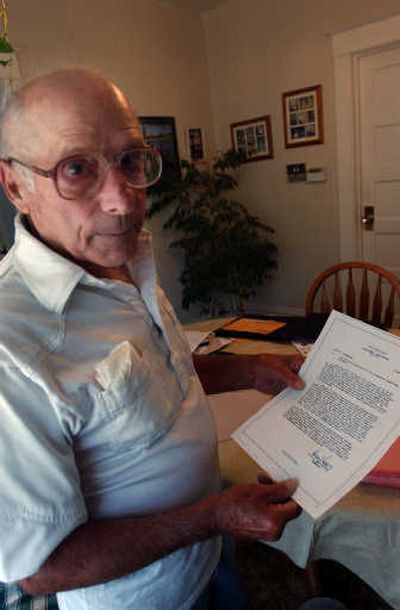Bronze Star medal arrives 62 years later

Gene Scolavino has been awarded the Bronze Star medal for meritorious achievement during his service in the Army.
He received it a little late.
Scolavino served as a combat medic in the 164th Infantry in the Solomon Islands during World War II.
Three weeks ago, when he checked the mail at his South Hill home, he finally received his medal.
He had been drafted at the age of 18 in 1943 and served with the infantry until November 1945. He said the higher-ups had told them, “You’re in for the duration of the war and then six months.”
Scolavino said he was surprised to be classified 1-A in the draft because he had tried to enlist in the Navy when he was 17 but had been rejected because of his 20/40 eyesight.
After he was drafted, Scolavino said, he got a letter in the mail that said, “Greetings from Uncle Sam.”
Scolavino, originally from Providence, R.I., said he isn’t sure why it took 62 years to receive his medal.
When his division was deactivated, all the members scattered across the United States.
An old Army buddy wrote him four months ago, telling him they were entitled to the medals and telling him about the paperwork he needed to complete.
When the medal arrived in the mail along with a Good Conduct Medal, an Asiatic Pacific Campaign Medal and a World War II Victory Medal, he gave them to his son, Gene Scolavino Jr., who plans to frame them.
He also gave his son the medal of which he is the proudest: his Combat Medic Medal.
Scolavino said only medics who worked in the field with the soldiers received that medal.
There were three combat medics in his division to treat 180 soldiers.
Scolavino said medics in the infantry didn’t have a red cross on their helmets and uniforms like you see in the movies.
“They make good targets,” he said.
Scolavino served in places such as Bougainville, New Caledonia and Fiji. When the war ended, the infantry was sent for occupation duty in Japan.
In 1949, Scolavino re-enlisted and soon was transferred to the Air Force. He trained in various survival schools around the country and in Puerto Rico and was stationed at Loring Air Force Base in Maine, Westover Air Force Base in Massachusetts and Thule Air Force Base in Greenland.
Scolavino was stationed at Stead Air Force Base in Nevada when its Survival School closed, and he moved to Fairchild Air Force Base.
Scolavino retired in 1974 as a senior staff sergeant at the Survival School at Fairchild.
Over the years since World War II, he married and divorced and raised his three children, Gene Jr., Joyce and Kenneth, by himself.
Gene Scolavino Jr. inherited his father’s military calling and spent eight years in the Air Force and 12 years in the National Guard.
After his retirement, Gene Scolavino Sr. spent a couple of years in the Air Force post office. Soon after, he picked up his golf clubs.
“I’m a full-time golfer,” he said. He also spends time with his dog, Shadow.
The arrival of the medals brought back a lot of memories of his days as a combat medic.
Scolavino treasures a photo album of pictures of his old friends sitting in front of their tents or kneeling in front of the graves of others.
“You miss a lot of the friends you lost,” he said.